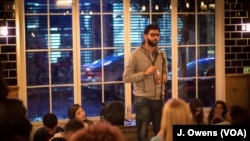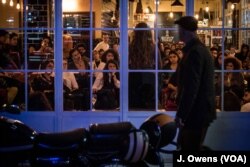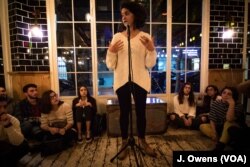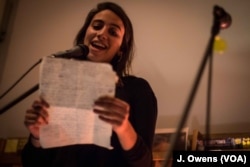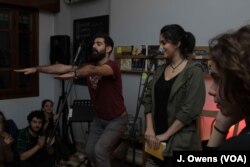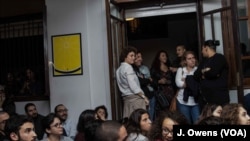It’s a drizzly night in central Beirut, and breaths are being held as 27-year-old Maytham Khassir tells a packed room full of strangers how his aunt was murdered by her ex-husband.
Khassir, emotional, finishes, and his eyes survey the audience. A pause. Then, filling the cafe, a swell of applause rises to meet him.
With the rapid rise of Beirut’s storytelling, scene moments like this are becoming ever more commonplace as Lebanese find they have a voice — and people willing to listen.
Embraced
“I was nervous and afraid at the beginning,” explains Khassir, who spoke at a storytelling evening focused on the issue of gender-based violence. “But when I saw how they were reacting to the story, I felt like I was being embraced.”
Storytelling and poetry have long played a part in the city’s vibrant cultural scene, often through its theatrical companies.
But in the past few years accessible and interactive events have exploded in number and popularity, from the occasional small-scale gathering to weekly events filling their venues to the brim. And while practiced talent often begins the show, the growth in popularity of the open-mic sessions are allowing first-timers like Khassir a place to be heard.
Tradition as inspiration
“I didn’t realize it would have such an impact,” explains Dima Matta, a teacher of English and creative writing at Balamand University, who launched a series of storytelling events in 2015 that came to be known as Cliffhangers. “I figured there’d be a group of university students who would come and share their stories, and then everyone would go about their way.”
That’s not how it worked out. They told their friends, who in turn told theirs, and soon, a host of other events were popping up across bars and cafes in the city.
A number of those in the scene who spoke to VOA pointed to a degree of influence from America, and high-profile storytelling events like The Moth, which has spawned its own award-winning national public radio show.
But they were also quick to reference the power of stories and the oral tradition within the region as inspiration.
It is a tradition evident in the tarboosh-sporting and cane-wielding Hakawatis — storytellers whose folkloric tales kept communities rapt for centuries but whose numbers have sharply dwindled — or simply in the stories passed through generations over the dinner table or by the glow of a bedside light.
“We come from a culture where storytelling is essential,” says Rima Abushakra, who in 2016 co-founded another collective called Hakaya — Arabic for "tale."
“In a region that has seen so much change, and a place where community and family are so central, they are central to memorializing moments," Abushakra said.
“It could also be that we’re just real talkers,” she adds, laughing.
A voice denied
Tales of the everyday and nonpolitical abound — anecdotes include heartbreak and humor.
Yet the scene’s emergence is also spurred by what many involved feel is the denial of individual voices within Lebanon, and the shutting down of discussion.
A Cliffhangers event marking Lebanon’s first-ever Pride Week in May drew hundreds of people, with many present telling deeply personal stories in a country where being LGBTQI can still potentially get you arrested.
“All these platforms are working for same purpose,” says Majd Shidiac, whose open mic poetry nights have also taken off in popularity.
“That is to give a platform for people to say what they need to say and create safe spaces for people performing, and to make words count,” he said.
When tens of thousands took to the streets of Beirut in 2015 in protests sparked by the piling up of trash on the city’s streets, Khassir, a journalist, felt duty-bound to not just report but participate.
However, jaded by the lack of change in a state riddled with corruption and still largely controlled by figures instrumental in a 15-year civil war that ended in 1990, it was with a sense of pessimism.
"When I go [to storytelling events], I see that there are people who are passionate and believe in change, too,” Khassir says, adding that telling the story of his aunt offered him a new way to speak out against injustice.
Lebanon has yet to produce a unified version for school textbooks regarding the country’s civil war, such is the lack of consensus within the country over its causes and consequences.
The conflict’s echo in contemporary Lebanon, an echo felt by subsequent generations, says Matta, fuels the need — and importance — of talking freely.
“We inherited all this trauma and anxiety, and it’s a question of what do we do with this as a people? People want to be listened to, and people want to listen.”
Beyond Beirut
So far, these events remain largely, though far from exclusively, attended by a certain segment of young, middle-class Beirutis.
Efforts are underway, however, to change that.
Abushakra stressed that Hakaya goes out of its way to reach out to new potential storytellers, whether Palestinian refugees or Lebanese from the economically impoverished northern city of Tripoli.
This month [December], meanwhile, Cliffhangers is set to break out of the capital by engaging with village communities.
And Matta, once again, is experiencing the nerves of those first few events two years ago.
“It’s definitely scary. We don’t know if people will show up, but we have to try,” she says. “People all over need this.”




